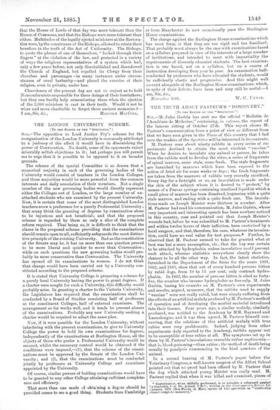THE LONDON UNIVERSITY SCHEME.
[TO THE EDITOR OP THE "SPECTATOR."]
SIR,—The opposition to Lord Justice Fry's scheme for the reorganisation of the-London University is commonly attributed to a jealousy of the effect it would have in diminishing the power of Convocation. No doubt, some of its opponents raised miserably selfish objections to it ; but perhaps you will permit me to urge that it is possible to be opposed to it on broader grounds.
The scheme of the special Committee is so drawn that a numerical majority in each of the governing bodies of the University would consist of teachers in the London Colleges, and these majorities would be more powerful from the common interests and daily association of their members. Not a single member of the new governing bodies would directly represent either the Colleges out of London, or the large number of un- attached students who are examined by the present University. Now, it is certain that some of the most distinguished London teachers avow a preference for a purely Professorial University ; that many think the granting of degrees by examination alone to be injurious and not beneficial; and that the proposed scheme is regarded by them as only a slice of the complete reform required. That being so, it is difficult to think that the clause in the proposed scheme providing that the examinations should remain open to all, sufficiently safeguards the most distinc- tive principle of the existing University. Bad as the constitution of the Senate may be, it has on more than one question proved to be more liberal and quicker to move than Convocation ; while on such questions the new governing bodies would pro- bably be more conservative than Convocation. The University has opened all its examinations to women. I do not think that change would have been carried out by a University con- stituted according to the proposed scheme.
It is stated that University College is preparing a scheme for a purely local University having the power to grant degrees. If a charter were sought for such a University, this difficulty would probably arise. In granting a charter to the Victoria University, the Legislature has required that the examinations shall be conducted by a Board of Studies consisting half of professors at the constituent Colleges, half of external examiners. The arrangement so far works well, and it tends to prevent abuses of the examinations. Probably any new University seeking a charter would be required to adopt the same plan.
Now, if it were possible for the London University, without interfering with the present examinations, to give to University College the power to hold its own examinations for degrees, independently of the examinations at Burlington House, all the objects of those who prefer a Professorial University would be secured, whilst the necessary control would be obtained if the conditions were imposed,—(1), that the scheme of the exami- nations must be approved by the Senate of the London Uni- versity; and (2), that the examinations must be conducted jointly by professors at University College and examiners appointed by the University.
Of course, similar powers of holding examinations would have to be granted to any other College attaining sufficient complete- ness and efficiency.
That more than one mode of obta:ning a degree should be provided seems to me a good thing. Students from Cambridge or from Manchester do now occasionally pass the Burlington House examinations.
The charge against the Burlington House examinations which has most force, is that they are too rigid and too fossilised. That probably must always be the case with examinations based on a syllabus prepared in view of the interests of a large number of institutions, and intended to meet with impartiality the requirements of diversely educated students. The best examina- tion is one based, not on a syllabus, but on a course of instruction developing from year to year. An examination half- conducted by professors who have educated the students, would be sufficiently elastic and progressive. And this might well co-exist alongside of the Burlington House examinations, which, in spite of their defects, have been and may still be useful.—I am, Sir, &c.,


































 Previous page
Previous page